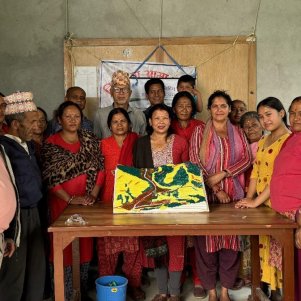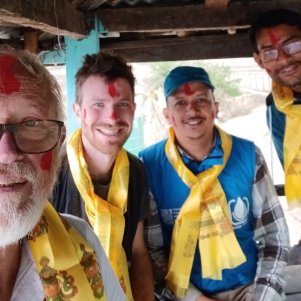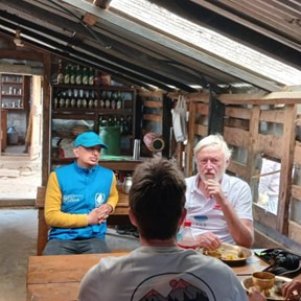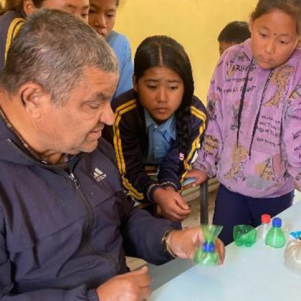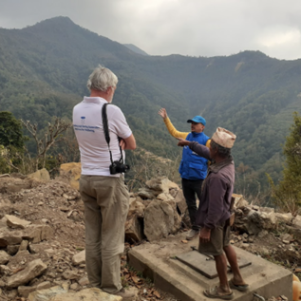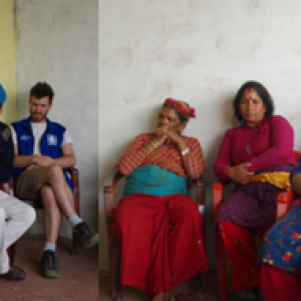Walking the trail in Nepal
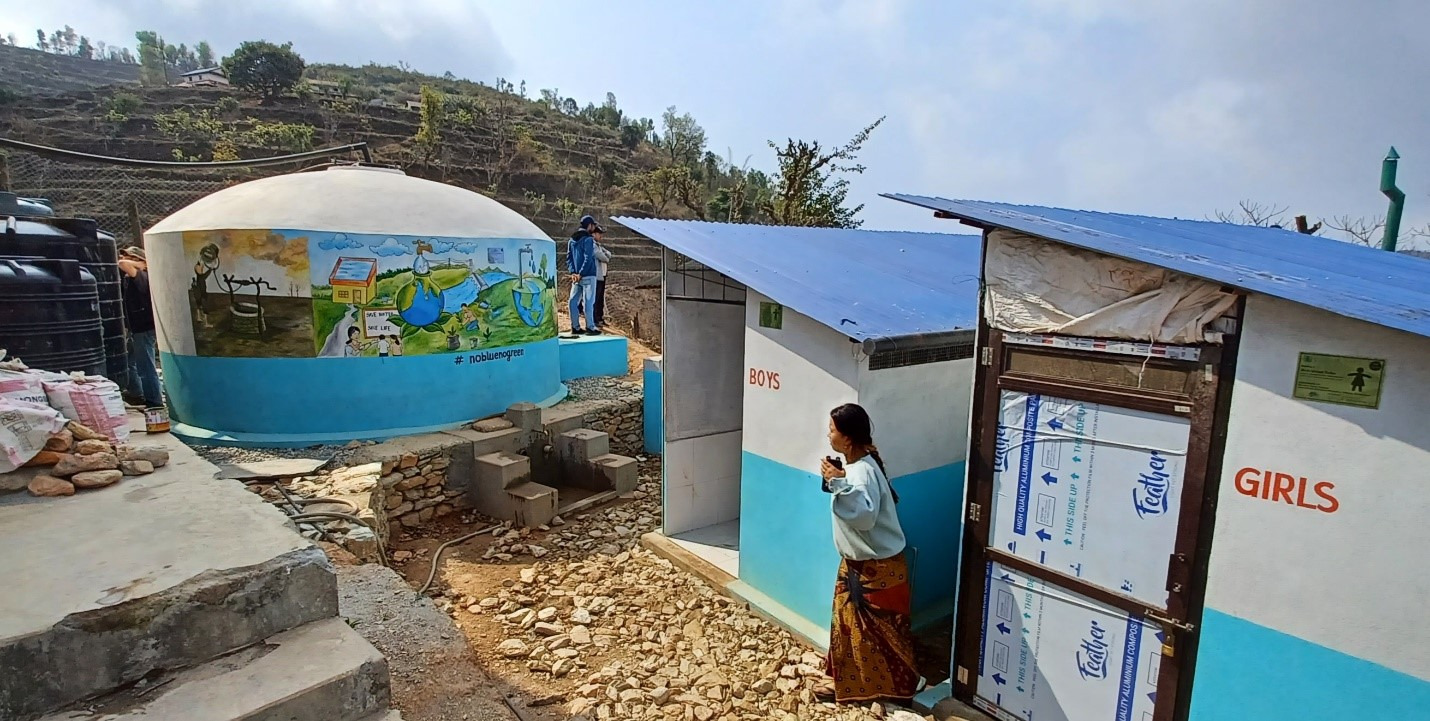
Following the 2-day Regional Rainwater Conference on 18 and 19th of March organized by the Nepal Rainwater Harvesting Alliance (see March newsletter), Florian Bielser, IRHA Programme Officer, and Han Heijnen, President of the IRHA Board, joined Nirmal Adhikari, programme coordinator of Kanchan Nepal, our partner, for a 10-day field trip to Chitwan and Kaski districts.
The purpose of our visit was to see how the IRHA supported projects in the two districts had evolved and to strengthen the collaboration between Kanchan Nepal, Sapana Village Social Impact (SVSI) from Sauraha, Chitwan and Local Initiatives for Biodiversity, Research, and Development (LI-BIRD) from Pokhara in the recently started Rain Communities project.
It brought us first to the house of Shreerendra Pokharel at the edge of Chitwan district. Shreerendra has been a long-standing partner in Kanchan Nepal projects demonstrating ecological sanitation and use of urine as fertilizer in vegetable farming and ways to turn waste plastics into useful items around the house. After a late lunch we turned to the interior of Chitwan, bordering Dhading district. The area is rather hilly, upto some 1800 m, and quite bare. The Chepang communities who live here are poor and find it hard to eke out a living. It has led to a landscape with few trees and forest reserves. In earlier projects, Kanchan Nepal and IRHA have supported SVSI to construct rainwater systems to the households in the upper reaches of the hills. This effort has helped the community to become more economically resilient, for instance through the development of homestay bed and breakfast facilities.
The current project has a broader focus on
“Rain Communities”, making communities more climate resilient by introducing
them to a range of good practices in agriculture and regenerating the landscape.
This expands beyond the technical capacities of Kanchan Nepal. Therefore, the
Rain Communities project has brought in SVSI in Chitwan and LI-BIRD as
partners.
Dharma Raj Dhakal, field coordinator of SVSI, joined us during our trip in Chitwan. He was able to explain the SVSI inputs in the project. One of these was the revival of fodder trees for livestock. He shared seeds of the trees with the community at every stop we made, promising to buy excess seedlings and in due course the seeds of the fully grown trees. It was good to see that the women’s group we met in Chappdanda was so well organized. Several women now had rainwater storage and welcomed the inputs of SVSI to provide additional support for vegetable gardening. It was clear that the recent agro-ecological training facilitated by SVSI and LI-BIRD was bearing fruit already.
The IRHA Blue School programme has
supported two Blue Schools in Chitwan in the past two years. It was good to be
able to visit the schools and see how the children and teachers benefitted from
the facilities. In Janapriya Blue School Nirmal installed a weather station to
monitor rainfall. As it is a secondary school, the weather station will also
help children to do practical projects as part of the curriculum. The weather station
is linked to the national grid and its data will contribute to a better local weather
forecast.
The next day we also visited the Adarsha Blue School. The project was completed in December 2023 and the children were enjoying the water and the toilet facilities. The headmaster and teachers were quite pleased with the result of the joint effort. The school management was still selecting some native trees and bushes for planting on the perimeter of the school compound.
Later we met with Dhruba Giri, chairman, and Sujan Basnet, programme director, of SVSI. They had travelled all the way from Sauraha – 2 hours on the motorbike – to meet us at Mayathar, near Gurkhes, another of the Rain Communities. During lunch we had time to get to know each other and discuss the starting-up of the joint project.
In Kaski district the focus was on strengthening
resilience through restoration of traditional ponds (pokhari’s) and finding
suggestions for new ones that could store water at higher elevation. Some
prospective locations were discussed with community members. In the Madi rural
municipality we discussed with the mayor about the rehabilitation of 30-year
old water supply systems. Some were still functioning but declining source
yield caused seasonal water shortages. The Rain Communities project will look
into options to improve the situation in a joint effort between Kanchan Nepal, the
municipality and the people. The 3-D models of the area that Kanchan Nepal has
been making through participatory processes will enable better decision making
on managed aquifer recharge through ponds, bunds and other means of slowing
down the run-off in the landscape.
An important component introduced by LI-BIRD into the Rain Communities project is the community seedbank. Local traditional seed varieties that have proven to produce reliably in the area are collected from the farms in the community. The Department of Agriculture comes to inspect the farms before planting, during growing and after harvesting. If all is done well, the seeds are certified and stored for future use in the area. In addition to having a store of good seeds, the plan is also to gradually increase the stock and variety of indigenous seeds.
In Pokhara we were able to conclude the programme with a discussion among all three partners at the LI-BIRD office. Partners presented their planned activities for the Rain Communities project and the status of the work done so far. It was clear that the project was going ahead well, with a further two years to gradually make the results visible in the community.
A worthwhile trip, with plenty of exercise and opportunity to talk to people and partners about this important effort to generate climate resilient communities by better use of rainwater.
